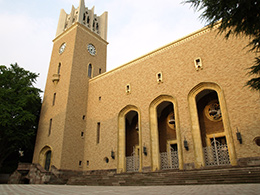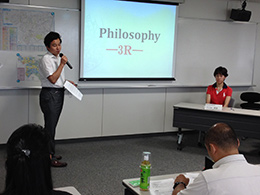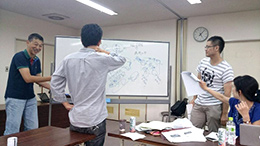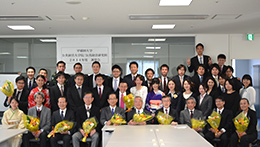JDS中国项目概述大学信息

- URL of Graduate School (English)
- https://www.waseda.jp/fpse/gsps/en/
- Name of Course/Program
- Political Science Course
- URL of Course/Program (English)
- https://www.waseda.jp/fpse/gsps/en/
- Degrees
- Master of Arts in Political Science
- Credit and years needed for graduation
- 32 credits for two years
Features of Graduate School

This graduate school has established required courses covering three methodological categories for our students to study: those covering empirical methods, in which reality is analyzed based on quantitative and qualitative data; those covering mathematical methods, in which reality is modeled and analyzed theoretically; and those covering methods of conceptual analysis, in which students are taught to understand and use normative concepts effectively. Building on these methodologies, we have established areas of study, including contemporary politics, political thought, political history, comparative politics, international relations, public policy, and journalism. Thus, we have created a framework in which students can proceed with their studies based on a strong methodological bedrock. This graduate school is proud of how it has produced numerous talented researchers and advanced professionals active in society who have studied such methodologies interwoven with specific topics of research. I have every confidence that this framework for research and education will serve as a vital set of intellectual infrastructure for conceiving of and researching responses to the current coronavirus pandemic.
Features of the Course/Program

The Political Science Course promotes a systematic and sophisticated approach to political science education within the Graduate School of Political Science and endeavors to be a beacon of international comparative research originating in Japan and firmly grounded in the latest theories and methods employed in the field of political science. Here, researchers are equipped with the most current and globally accepted political science methodologies as well as an intrinsic understanding of Japan and Asia.
At the same time, this course aims to cultivate hands-on experts who, as masters of science well-versed in the specialized knowledge of political science, are capable of demonstrating leadership in various areas to build a more just society and who can serve as the voice of Japan and Asia in promoting a well-ordered global community.
Necessary Curriculum to Obtain the Degrees
Courses taught through English language for the 2023 academic year (English Course)
A list for FY2022 is attached.
The subjects will be generally the same in FY2023 and beyond.
List of Faculty members capable of guiding JDS China Fellows
and their Research Specialties
This list is current as of the date of submission. It is subject to change after the time of admission due to sabbaticals or other circumstances.
| Name of Supervisor | Research Field |
|---|---|
| ONO, Yoshikuni | Political Behavior |
| KUME, Ikuo | Comparative Political Economy, Japanese Politics |
| KOHNO, Masaru | Political Theory, Japanese Politics, Electoral Systems Research |
| YOSHINO, Takashi | Anglo-American Politics, Political Party Theory, American Politics |
| ASANO, Toyomi | History of Japanese Politics |
| INAMURA, Kazutaka | Political Philosophy, History of Political Thought |
| UMEMORI, Naoyuki | History of Japanese Political Thought |
| SAITO, Junichi | Political Theory |
| SASADA, Eiji | Constitutional Law |
| CHUNG, Hun | Political Philosophy, Formal Theory, PPE (Philosophy, Politics, & Economics) |
| NAKAUCHI, Eizo | History of Western Politics |
| YAZAWA, Masashi | Contemporary Political Theory |
| KUBO, Keiichi | Comparative Politics |
| KELLAM, Marisa | Comparative Politics |
| JOU, Willy | Public Opinion, Political Culture |
| TAKAHASHI, Yuriko | Comparative Politics (Politics of Emerging and Developing Countries), Comparative Political Economy, Public Policy |
| TANG, Liang | Comparative Politics, Chinese Politics |
| HINO, Airo | Empirical Analysis of Media and Elections, Comparative Politics of Western Europe |
| MAGARA, Hideko | Comparative Politics |
| KUNIYOSHI, Tomoki | Japanese Diplomacy; History, Theory, and Analysis of the US-Japanese Security System |
| KURIZAKI, Shuhei | International Relations, International Security, Formal Political Theory |
| TANAKA, Takahiko | History of International Relations, History of the Cold War, Global Order Studies |
| TOHYA, Hiroki | Global Political Economy |
| TOMARU, Junko | International Migrations, History of Post-War International Relations |
| NAKAMURA, Hidetoshi | International Politics, Theory of International Organizations, Regional Integration |
Through joint research guidance in the research area they belong to upon entering, new students choose one Main Advisor at the beginning of their first academic year. Students must ensure that application procedures for choosing their Main Advisor are filed within the designated period. After consulting with their Main Advisor, students in all years can choose one Sub-Advisor. It is strongly recommended that students enroll in seminars held by their chosen Sub-Advisor. Sub-Advisors can be selected from areas of study outside a student’s primary research area as well as other courses within the Graduate School (limited to faculty members who hold seminars). In principle, applications for selecting Sub-Advisors are filed every academic year, so students must make sure to make their application within the designated period. Sub-Advisors for whom applications are filed in the academic year in which a Master thesis is submitted will become assistant screeners for the Master thesis screening process.
Academic Schedule
Facilities (ex: Library, PCs, Gymnasium etc...)

Library, PCs, Gymnasium etc.
https://www.waseda.jp/fpse/gsps/en/students/facility/
Advice for our Graduate School Applicants

The Political Science Course aims to endow researchers with the most current and globally accepted political science methodologies and a deep understanding of Japanese and international politics. At the same time, the program aims to train professionals endowed with a practical viewpoint and specialized knowledge in political science.
Graduates of the program can demonstrate leadership in a wide variety of fields. They have the tools needed to achieve a politically sound international community and contribute to building the framework for an ideal global society and strive for its realization.


